

Chrono-nutrition for the prevention and treatment of obesity and type 2 diabetes: from mice to men. Diet and sleep health: a scoping review of intervention studies in adults - Burrows - 2020 - Journal of Human Nutrition and Dietetics. Introduction Individually, poor dietary intake and poor sleep are associated with increased risk of developing obesity and weight‐related chronic diseases such as type 2 diabetes and coronary heart disease 1-3.
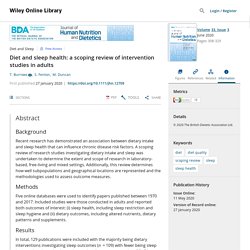
Sleep disturbance is hypothesised to interfere with the bodies restorative processes that occur during sleep, which can lead to biological risk factors for chronic disease (e.g. decreased insulin sensitivity) 4. In the USA, 54% of adults are estimated to have a poor quality diet 5 and less than two‐thirds of adults sleep for the recommended 7–9 h per night 6, 7, whereas one‐quarter report poor sleep quality 8. Effects of Diet on Sleep: A Narrative Review. 1.

Chrononutrition and Polyphenols: Roles and Diseases. In the last few years, there has been increasing recognition of the impact of the biological clock on nutrition, with different effects on energy balance and metabolism and influences on health and diseases.
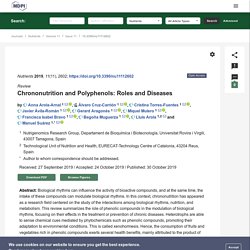
This concept has led to the development of a new discipline known as chrononutrition [21], which was first mentioned in a Japanese book about nutrition and health published in 2005 [22]. Since then, chrononutrition has emerged as a research field focused on the study of the interactions between biological rhythms, nutrition, and metabolism [21]. Dietary Interventions for Night Shift Workers: A Literature Review. 1.
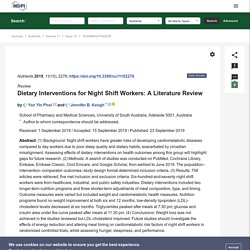
Introduction Shift workers are people who work rotating shifts, irregular shifts, evening shifts, afternoon shifts, morning shifts, or split shifts [1]. In Australia, shift workers make up 16% of employees aged 15 years and over, comprising 1.4 million people [1]. Shift workers are known to have elevated cardiometabolic risk factors including higher levels of triglycerides, and lower levels of high-density lipoprotein (HDL)-cholesterol [2]. Time-Restricted Eating to Prevent and Manage Chronic Metabolic Diseases. Relationship between sleep duration and childhood obesity: Systematic review including the potential underlying mechanisms - Nutrition, Metabolism and Cardiovascular Diseases.
Meal Frequency and Timing Are Associated with Changes in Body Mass Index in Adventist Health Study 2. © 2017 American Society for Nutrition + Author Affiliations Address correspondence to GEF (e-mail: gfraser@llu.edu).
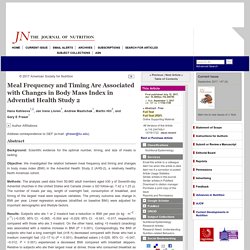
Abstract Background: Scientific evidence for the optimal number, timing, and size of meals is lacking. Objective: We investigated the relation between meal frequency and timing and changes in body mass index (BMI) in the Adventist Health Study 2 (AHS-2), a relatively healthy North American cohort. Methods: The analysis used data from 50,660 adult members aged ≥30 y of Seventh-day Adventist churches in the United States and Canada (mean ± SD follow-up: 7.42 ± 1.23 y).
Results: Subjects who ate 1 or 2 meals/d had a reduction in BMI per year (in kg · m−2 · y−1) (−0.035; 95% CI: −0.065, −0.004 and −0.029; 95% CI: −0.041, −0.017, respectively) compared with those who ate 3 meals/d. Dietary and nutrition interventions for the therapeutic treatment of chronic fatigue syndrome/myalgic encephalomyelitis: a systematic review - Campagnolo - 2017 - Journal of Human Nutrition and Dietetics. Background Chronic fatigue syndrome/myalgic encephalomyelitis (CFS/ME) is characterised by unexplained fatigue for at least 6 months accompanied by a diverse but consistent set of symptoms.

Diet modification and nutritional supplements could be used to improve patient outcomes, such fatigue and quality of life. We reviewed and discussed the evidence for nutritional interventions that may assist in alleviating symptoms of CFS/ME. Methods Medline, Cinahl and Scopus were systematically searched from 1994 to May 2016. Results Seventeen studies were included that meet the inclusion criteria. Conclusions This review identified insufficient evidence for the use of nutritional supplements and elimination or modified diets to relieve CFS/ME symptoms. Sleep Duration Recommendation. The Role of Sleep Duration on Energy Balance: an Update. Effects of Diet on Sleep Quality. Abstract There is much emerging information surrounding the impact of sleep duration and quality on food choice and consumption in both children and adults.
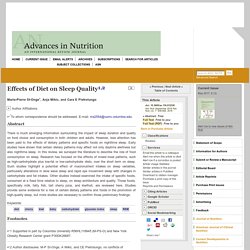
However, less attention has been paid to the effects of dietary patterns and specific foods on nighttime sleep. Early studies have shown that certain dietary patterns may affect not only daytime alertness but also nighttime sleep. In this review, we surveyed the literature to describe the role of food consumption on sleep. Research has focused on the effects of mixed meal patterns, such as high-carbohydrate plus low-fat or low-carbohydrate diets, over the short term on sleep. Keywords: Footnotes. Nutrition and the circadian system. How Much Sleep Do We Really Need? - National Sleep Foundation. View Larger >> Sleep is a vital indicator of overall health and well-being.
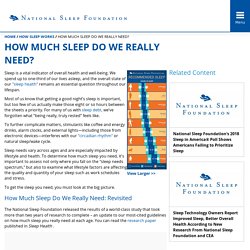
We spend up to one-third of our lives asleep, and the overall state of our "sleep health" remains an essential question throughout our lifespan. Most of us know that getting a good night’s sleep is important, but too few of us actually make those eight or so hours between the sheets a priority. For many of us with sleep debt, we’ve forgotten what “being really, truly rested” feels like. To further complicate matters, stimulants like coffee and energy drinks, alarm clocks, and external lights—including those from electronic devices—interferes with our "circadian rhythm" or natural sleep/wake cycle.
Sleep needs vary across ages and are especially impacted by lifestyle and health. To get the sleep you need, you must look at the big picture. הנחיות תזונתיות לעבודה במשמרות. SIDS and Other Sleep-Related Infant Deaths: Updated 2016 Recommendations for a Safe Infant Sleeping Environment. The Importance of Healthy Sleep. Recommendations and Future Priorities. Sleep Duration and Quality: Impact on Lifestyle Behaviors and Cardiometabolic Health: A Scientific Statement From the American Heart Association.